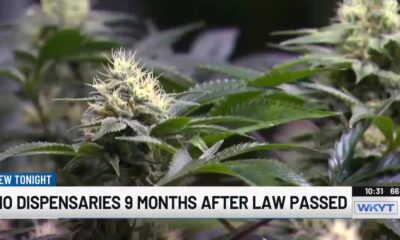Addiction
Yale Researchers To Study Psilocybin for PTSD, Mental Conditions
Published
1 year agoon

A pilot program on the benefits of synthetic psilocybin for mental health issues like post-traumatic stress disorder (PTSD) is set to begin this summer at Yale University in New Haven, Connecticut.
A study cohort will consist of 50 patients, mostly veterans and first responders, who are with mental health concerns like depression and addiction. Participants will take 25 mg of synthetic psilocybin, and after the psychedelic effects wind down, they will discuss issues and progress (or lack thereof) with trained therapists.
Connecticut Post reports that the goal is to fulfill the need for state data that has been lacking, according to state Rep. Michelle Cook (D-Torrington).
“We need to have the data to show that there is documented proof of what that therapy does,” Cook said. “We know that it has some incredible outcomes when it is done right, when it’s done by people that are trained in how to use it for treatment of PTSD and so forth.”
Researchers at Yale have been studying the “psychological, neurobiological, and therapeutic effects of psychedelic substances” like psilocybin for decades..
Using a Schedule 1 drug in a clinical setting creates a set of unique problems, including the inability to use insurance. “Even though it’s a research program, you are treating them clinically. And then, in order to treat them clinically, you need to have malpractice coverage,” said Yale researcher Ben Kelmendi. Kelmendi and his team are about to embark on a first-of-its-kind study, a pilot program at Yale.
Research on the medical benefits of psilocybin have been severely hampered due to legal restrictions, Kelmendi said. Only certain qualifying conditions are acceptable in this case. PTSD, for instance, is a complex issue that many people fail to treat.
“With veterans, they will not seek treatment right away,” Kelmendi said. “They will start turning to alcohol or other substances, and so that now they have a comorbidity, and that comorbidity—which really is their own way of coping—will exclude them from the study. They are real patients who are actually suffering and who actually need help. They cannot access these medicines because they do not fit that cookie-cutter profile.”
The impact of PTSD is hard to define as it affects multiple aspects of daily life.
“There is no one scale that actually captures the complexity of one’s daily functional impairment. It’s actually an index of several different scales,” he said. “One is days missed at work, productivity and relationships, just more daily living. I think that is much more important than saying ‘Oh, have your PTSD symptoms improved or not?’”
Participants will take 25 mg of synthetic psilocybin, enough to induce a psychedelic experience, and the therapy is patient-directed. They will be taken in a comfortable space and about six hours later, participants will undergo a psychotherapy session.
“Twenty-five milligrams would be considered a moderate dose. It’s not a heroic dose necessarily, but it’s a psychoactive dose, for sure,” Kelmendi said. “The non-directive supportive psychotherapy is to be done after the dosing rather than during the dosing.”
The Many Potential Health Benefits of Psilocybin
The Yale Program for Psychedelic Science supports this goal with several currently active studies on psilocybin. These include studies on Obsessive Compulsive Disorder (OCD), Major Depressive Disorder (MDD), cluster headaches, post-traumatic headaches, and migraines. Kelmendi is working on several of them.A 2022 report published by a working group under the direction of the Connecticut Department of Mental Health and Addiction Services, was clear about the potential of psilocybin in therapeutic medicine.
Even people who don’t necessarily intend to gain benefits for mental health from psilocybin are still benefitting, a separate study suggests. A study published last September found that using psilocybin outside of a clinical setting was associated with mental health benefits including decreases in anxiety and depression. The research, which was published September in the journal Frontiers in Psychiatry, studied nearly 3,000 people who reported on their experience taking psilocybin mushrooms.
To conduct the study, which is reportedly the largest study of psilocybin in a naturalistic (non-clinical) setting, researchers spent two years collecting data from 2,833 participants who planned to take psilocybin for purposes of “self-exploration.” Most participants were college-educated white men in the United States who had previous experience taking psychedelic drugs.
The study participants were asked to fill out five surveys as part of the research. The first survey was completed two weeks prior to the psilocybin experience, which usually consisted of ingesting dried mushrooms, and again the day before the planned psychedelic trip. The remaining surveys were taken one to three days after the experience, two to four weeks after and two to four months after taking the psilocybin.
After analyzing the data from the surveys, researchers determined that participants reported long-lasting reductions in anxiety, depression, alcohol misuse, neuroticism and burnout. Additionally, the participants reported improvements in cognitive flexibility, emotion regulation, spiritual well-being and extraversion. The new research aims to add to the body of knowledge of what is known about the effects of psilocybin.

Author: mscannabiz.com
MScannaBIZ for all you Mississippi Cannabis News and Information.
You may like
-


Kentucky still waiting on medical marijuana dispensaries 9 months after law passed
-


Can LSD Battle Anxiety? The Answer Is Yes, According to Science
-


Six hurt in shooting at marijuana event in SF's Bayview
-


Kentucky Medical Marijuana Dispensaries Should Be Stocked With Products Ready For Sale By Next Month, Top State Official Says
-


Deputies: 3,500 child sex abuse images, marijuana grow operation found in NC home raid
-


Regulators Ready to Enforce Cannabis Laws on Hemp THC Retailers in Maryland
In an interview with Taste of Country published on May 24, Grammy Award-nominated country artist Jason “Jelly Roll” DeFord said that he smokes weed to stay away from hard drugs that he’s used in the past—namely opioids and benzodiazepines.
Given his past as an addict and his role in speaking against the use of fentanyl sweeping the country, the interview quickly shifted on the topic of drugs. But Jelly Roll doesn’t see weed the same way as hard drugs which can tear families apart and lead to deadly overdoses.
“I get in trouble for this, all the time, but my stance on marijuana will always be the same: I believe marijuana has helped me in so many regards, with my anxiety,” Jelly Roll told Taste of Country. “This is a hot button topic, but, truly, marijuana has kept me sober.”
The country superstar paused for a moment, then added, “I think a world without weed, Jelly Roll’s drinking codeine and popping Xanax and snorting cocaine again, but a world with weed, I’ll be alright.”
Jelly Roll abandoned hip-hop for a career in country music—which turned out to be a wise and lucrative decision. Jelly Roll’s album Whitsitt Chapel hit number 1 on the Billboard Top Rock Albums chart and number 2 on the Billboard Top Country Albums in 2023. In November 2023, he won the award for New Artist of the Year at the 57th Annual Country Music Association Awards. He’s won three CMT Music Awards and several other accolades.
TMZ reports that Jelly Roll has been a huge voice against fentanyl use and an example for people dealing with drug addiction. Last January, he appeared in front of Congress to back anti-fentanyl legislation called the Fentanyl Eradication and Narcotics Deterrence (FEND) Off Fentanyl Act.
Jelly Roll gave an opening statement at a Senate Banking, Housing, and Urban Affairs Committee hearing about fentanyl awareness and legislative solutions to stop illegal smuggling of fentanyl. “Fentanyl transcends partisanship and ideology…this is a totally different problem,” he started the hearing with in a speech that was described by many as “powerful.”
‘The sad news is that narrative is changing, too, because the statistics say that in all likelihood almost every person in this room has lost a friend, family member of colleague to the disease known as addiction,’ DeFord told the committee chaired by Cleveland Democrat Sherrod Brown. ‘I could sit here and cry for days about the caskets I’ve carried of people I love dearly.’”
Jelly Roll with a powerful testimony in Congress today urging lawmakers to pass legislation to combat the supply and distribution of fentanyl:
“I was a part of the problem. I am here now standing as a man that wants to be a part of the solution” pic.twitter.com/V2GiiKVS0q
— Wu Tang is for the Children (@WUTangKids) January 12, 2024
His messages about fentanyl and hard drug use, and the potential of replacing them with a less dangerous substance such as pot, have made a lasting impact.
Cannabis for Addiction
Cannabis has been explored for its potential role in fighting addiction of hard drugs. Some studies have focused on CBD for treating addiction disorders, some of which are caused by compulsive cravings, while others focused on THC as well.
While many studies have focused on cannabis to curb opioid use with some looking more broadly at stimulants, new research suggests that it could prove useful for those with crack use disorder (CUD). In fact, the popular non-psychoactive CBD, or cannabidiol, seems to be the key element.
The study, published recently in the International Journal of Mental Health and Addiction, utilized a double-blind randomized clinical trial comparing CBD to three drugs commonly used to treat CUD: fluoxetine, valproic acid and clonazepam. Authors represent a number of Brazilian academic and official institutions, comprising various departments at the University of Brasília, the Brazilian Federal District’s secretary of health and forensic institute and the Federal University of São Paulo.
The research ultimately found that participants who took CBD had better health outcomes and fewer adverse effects compared to those who underwent traditional pharmaceutical options.
In another study published in the journal Addictive Behaviors, researchers found that cannabis is not only widely used to manage stimulant cravings but that it may be an effective strategy to reduce stimulant use.
To further analyze how cannabis use may affect people using stimulant drugs, researchers collected data from three cohorts in Vancouver, Canada: the At-Risk Youth Study (ARYS), the Vancouver Injection Drug Users Study (VIDUS) and the AIDS Care Cohort to Evaluate Exposure to Survival Services (ACCESS).
Researchers used a cross-sectional questionnaire alongside logistic regression models to analyze the relationship between cannabis use to manage stimulant cravings as well as self-reported changes in the frequency of stimulant use.
Many others say cannabis replaced their daily alcohol use.
The studies seem to back up some of the claims about cannabis and sobriety. Jelly Roll, like country outlaw Willie Nelson, are helping to spread the good word on cannabis to the country music world.

Author: mscannabiz.com
MScannaBIZ for all you Mississippi Cannabis News and Information.
Addiction
Daily or Near-Daily Cannabis Users Outnumber Alcohol Users of Same Frequency
Published
1 year agoon
May 23, 2024
The rising prominence of regular cannabis use over alcohol use is nothing new.
We’ve witnessed myriad research in recent years showing that states with legal recreational cannabis see decreases in alcohol use, that Gen Z tends to prefer cannabis over alcohol and other reports noting that cannabis has consistently generated more tax revenue than alcohol and cigarettes in states like Colorado and Washington.
So it’s not necessarily a surprise that, for the first time, the number of Americans who use cannabis on a daily, or near-daily, basis has eclipsed those who drink alcohol at the same frequency. Associated Press first reported on the recent analysis of national survey data, finding that an estimated 17.7 million people reported daily or near-daily cannabis use, compared to 14.7 million daily or near-daily American drinkers.
For comparison, 1992 was the low point for daily cannabis use as less than 1 million people at the time said they used cannabis every day.
Daily Use Among 40% of Cannabis Consumers
According to study author Jonathan Caulkins, who researches cannabis policy at Carnegie Mellon University, alcohol is still more widely used, but 2022 was the first time that the level of cannabis use overtook daily or near-daily drinking.
“A good 40% of current cannabis users are using it daily or near daily, a pattern that is more associated with tobacco use than typical alcohol use,” Caulkins said.
Caulkins’ study, titled “Changes in self-reported cannabis use in the United States from 1979 to 2022,” is based on data from the National Survey on Drug Use and Health and published in the journal Addiction on Wednesday. It notes that there was a 15-fold increase in the per capita rate of reporting daily or near-daily cannabis use from 1992 to 2022, whereas the 1992 survey found 10 times as many daily or near-daily alcohol users compared to cannabis users.
Reflecting alcohol as the more commonly used substance, the study notes that the median drinker reported alcohol use on four to five days in the past month, versus 15 to 16 days of past-month use for cannabis users. Past-month cannabis consumers were almost four times as likely to report daily or near-daily use and 7.4 times more likely to report daily use, according to the study.
A Decades-Long Journey for Cannabis
Of course, this trend is no accident. It’s the product of gradual policy changes, advocacy and broader education surrounding the true nature of cannabis use and cannabis consumers following decades of skewed propaganda and harsh criminalization.
The study notes four major periods of cannabis policy fluctuation in the U.S., starting with liberalization in the ‘70s as 11 states decriminalized or reduced cannabis-related penalties. This is alongside the Shafer Commission report, which countered the popular notion that cannabis users were dangerous, concluding that users tend to be more passive and cannabis does not cause widespread danger to society. It also recommended social measures to curb usage rather than criminalization.
The more conservative policies of the 1980s and early ‘90s followed, with President Reagan and Bush Sr.’s now somewhat infamous War on Drugs in full force. The third major period outlined by the study spans 1993 to 2008, a period of “state-led liberalization” underscored by an increasing recognition of medical cannabis contrary to federal policy.
Finally, we witness the period of “explicit non-interference by the federal government” starting in 2009, with Deputy Attorney General David Ogden’s memo prompting American attorneys not to focus “federal resources in your states on individuals whose actions are in clear and unambiguous compliance with existing state laws providing for the medical use of marijuana.”
Just a few years later, Colorado and Washington became the first states to legalize adult-use cannabis.
“There were myriad other changes at the local, state and federal level in both law and policy,” the study notes. “Change has been continual, so these epochs are just signposts, not the only moments of change.”
Weighing Impacts of Daily Cannabis Use Over Daily Alcohol Use
For those who have tried cannabis and who use it routinely, this information may not come as much of a surprise. American attitudes around cannabis have shifted, with the majority routinely sharing they consider cannabis as a safer alternative that alcohol and cigarettes.
Research is also increasingly finding a lack of “hangover” effects in cannabis users, showing no evidence of next-day effects following THC consumption. This, of course, acts in stark contrast to alcohol use, so those who use cannabis frequently arguably have fewer obstacles to navigate surrounding general day-to-day functions. In addition, research is increasingly finding that even chronic pot use has minimal effects on motivation.
Regular cannabis use isn’t without its faults. The Associated Press report includes the perspective of University of Maryland School of Medicine psychiatry professor Dr. David A. Gorelick, who notes that high-frequency cannabis users are more likely to become addicted to cannabis. Gorelick was not involved in the original study.
Some studies have also pointed to increased risk in heart problems among heavy cannabis users (though other studies have suggested the opposite).
There’s also been a recent influx in studies suggesting that cannabis use, especially surrounding high-potency products, produces greater risk in developing psychosis. While substance abuse disorders indeed carry psychiatric comorbidities, there is limited evidence surrounding how this relationship translates to the general population and how much substance use disorders are driven by such comorbidities.
A number of studies have combated that narrative with advocates often arguing that touting this relationship between cannabis use and psychosis is simply the newest iteration of “reefer madness” of past years.
Of course, more research is needed to fully determine the health impacts of regular cannabis use — something that the upcoming Schedule III status of cannabis will likely aid in.
That said, regular alcohol use is known to affect how the brain works over time, damage the heart, increase risk of stroke and high blood pressure and weaken the immune system, leaving people more susceptible to illness. There’s also the toll it takes on the liver and pancreas and its potential to cause several types of cancer.
While cannabis may not be perfect, even your standard “recreational” user is likely to cite a number of medical-specific benefits they enjoy from their use. Many regular cannabis users utilize it as a means to better wellness or to usher in specific symptom relief while also helping to provide a sense of ease and escape from their struggles.
All to say, research like this often affirms what those in the cannabis community have been saying for years. Perhaps society is finally beginning to catch up.

Author: mscannabiz.com
MScannaBIZ for all you Mississippi Cannabis News and Information.
Addiction
Quit Meth, Get Paid in Innovative California Recovery Program
Published
1 year agoon
May 22, 2024
A new California program incentivizes people using meth or cocaine with money if they can prove they are clean in an evidence-based system in which participants can earn incrementally more the longer they stay clean. Why? Because California is grappling with substance use disorder “crisis” with deaths from cocaine, meth, and other stimulants soaring in recent years. In 2021 for instance, 65% of drug-related overdose deaths involved stimulants, compared to 22% in 2011. The impulsive nature of stimulant cravings and addiction calls for alternative approaches.
A Medi-Cal initiative called CalAIM provides social and behavioral health services, including addiction treatment to individuals in California . California Healthline reports that CalAIM provides people who use meth and cocaine with an incentive to quit habit-forming drugs that are difficult to kick on your own.
Contingency Management (CM) is a program that provides motivational incentives to treat people who use stimulants like meth or cocaine, and support their path to recovery. It recognizes and reinforces individual positive behavioral change, and requires them to prove it with drug tests showing negative results for stimulants. “CM is the only treatment that has demonstrated robust outcomes for individuals living with stimulant use disorder, including reduction or cessation of drug use and longer retention in treatment,” the program states.
“The Recovery Incentives Program increases access to new evidence-based treatments for Californians living with substance use disorder,” the program’s Fact Sheet states. “Starting in 2023, the program is available to members living with stimulant use disorder in participating counties, in outpatient, intensive outpatient, and Narcotic Treatment Program settings. As part of the program, eligible Medi-Cal members participate in a structured 24-week outpatient program, followed by at least six months of additional recovery support services. Participants meet with a trained contingency management coordinator twice weekly for the first 12 weeks of the program, then weekly for weeks 13 to 24 to complete a drug test. Participants receive a small gift card each time they test negative for stimulants and can earn up to $599 per year in incentives.”
California is the first state in the country to receive federal approval of CM as a benefit in the Medicaid program through the CalAIM 1115 Demonstration. CM also tested other sources of funding.
According to the state Department of Health Care Services, about 2,700 patients from 19 counties have enrolled in the program since April 2023.
Quinn Coburn, 65, who is in the program, told California Healthline, “It’s that little something that’s holding me accountable.” Coburn received $10 for each clean urine test he provided the first week of the program, and the pay increases in subsequent weeks: $11.50 per test in week two, $13 in week three—up to $26.50 per test.
The program promises as much as $599 a year, and Coburn is proof that it’s doable: As of mid-May, Coburn had completed 20 weeks of clean drug tests and made $521.50.
“The way stimulants work on the brain is different than how opiates or alcohol works on the brain,” said John Duff, lead program director at Common Goals, where Coburn receives treatment. “The reward system in the brain is more activated with amphetamine users, so getting $10 or $20 at a time is more enticing than sitting in group therapy.”.
The average recovery rate for people suffering from meth addiction is around 37%, which is about equal to other physically addictive drugs such as cocaine, heroin, and prescription drugs. Cannabis is also being explored as a potential treatment to help reduce stimulant cravings.
Fighting Meth Abuse at the National Level
The fight against meth abuse is also taking place at the national level.
In 2022, President Joe Biden signed legislation designed to address the rising scourge of meth abuse in the United States.
The new law, titled the Methamphetamine Response Act, “requires the government to declare methamphetamine an ‘emerging drug threat’ and to develop a response plan specific to methamphetamine,” according to a press release.
The bill had bipartisan support in the House of Representatives and Senate: its sponsors were Sens. Dianne Feinstein (D-Calif.) and Chuck Grassley (R-Iowa) and Reps. Scott Peters (D-Calif.) and John Curtis (R-Utah).
According to a study from the National Institutes of Health, “overdose deaths involving methamphetamine nearly tripled from 2015 to 2019 among people ages 18-64 in the United States.” That study showed that the “number of people who reported using methamphetamine during this time did not increase as steeply, but the analysis found that populations with methamphetamine use disorder have become more diverse,” suggesting that “increases in higher-risk patterns of methamphetamine use, such as increases in methamphetamine use disorder, frequent use, and use of other drugs at the same time, may be contributing to the rise in overdose deaths.”

Author: mscannabiz.com
MScannaBIZ for all you Mississippi Cannabis News and Information.

Kentucky still waiting on medical marijuana dispensaries 9 months after law passed

Can LSD Battle Anxiety? The Answer Is Yes, According to Science

Six hurt in shooting at marijuana event in SF's Bayview

Kentucky Medical Marijuana Dispensaries Should Be Stocked With Products Ready For Sale By Next Month, Top State Official Says

Deputies: 3,500 child sex abuse images, marijuana grow operation found in NC home raid

Regulators Ready to Enforce Cannabis Laws on Hemp THC Retailers in Maryland

California reaps over $250 million from 2nd Quarter cannabis sales

Meet the World’s First Cannabis Rugby Team: Crewmen 7’s Tackle Stigma Head-On

Texas Supreme Court Refuses To Take Up Marijuana Case Challenging State’s Rejection Of Local Decriminalization Law

California Passes Bill to Ban Intoxicating Hemp Products Outside Cannabis Market

Pending Federal Hemp Legislation Could Reshape The Legal Industry By Banning Some Products (Op-Ed)

Verano Proposes to Redomicile Parent Company From British Columbia to Nevada

8,000 cannabis plants seized from illegal Bradford grow-op

New York Lawmakers Schedule Psychedelics-Focused Hearing To Discuss ‘Medicinal Value And Risks’ Of Psilocybin

Curaleaf Opens Cannabis Dispensaries in Florida, Ohio

How to Protect Your Outdoor Cannabis Crops From Pests

Feds provide anti-cannabis group a platform to bash legalization (Newsletter: September 15, 2025)

Dozen arrested after south Mississippi bust for illegal sales to underage customers

The Toking Traveler: Why Amsterdam Weed Is Mostly Boof

Arkansas Medical Marijuana Sales Are On Track To Set A New Annual Record

When Cannabis Brands Blur Into Youth Culture, Regulators Notice: Lessons From Tobacco’s Past

Rhode Island Marijuana Dispensary License Application Process Officially Launches

Middle school student found with cannabis in bookbag, Charles County deputies say

Smugglers who brought drugs on an industrial scale into Wales jailed

Alert: Department of Cannabis Control updates data dashboards with full data for 2023

Connecticut Appoints The US’s First Cannabis Ombudsperson – Yes there is a pun in there and I’m Sure Erin Kirk Is Going To Hear It More Than Once!

5 best CBD creams of 2024 by Leafly

EU initiative begins bid to open access to psychedelic therapies
New Study Analyzes the Effects of THCV, CBD on Weight Loss

Free delta-9 gummies from Bay Smokes

5 best autoflower seed banks of 2024 by Leafly

Discover New York’s dankest cannabis brands [September 2024]

Press Release: CANNRA Calls for Farm Bill to Clarify Existing State Authority to Regulate Hemp Products

Curaleaf Start Process Of Getting Their Claws Into The UK’s National Health System – With Former MP (Resigned Today 30/5/24) As The Front Man

May 2024 Leafly HighLight: Pink Runtz strain

Local medical cannabis dispensary reacts to MSDH pulling Rapid Analytics License – WLBT

Recreational cannabis on ballot for third time in South Dakota

5 best THC drinks of 2024 by Leafly

Horn Lake denies cannabis dispensary request to allow sale of drug paraphernalia and Sunday sales | News

Mississippi city official pleads guilty to selling fake CBD products

6 best CBD gummies of 2024 by Leafly

Nevada CCB to Accept Applications for Cannabis Establishments in White Pine County – “Only one cultivation and one production license will be awarded in White Pine County”

The Daily Hit: October 2, 2024

5 best delta-9 THC gummies of 2024 by Leafly

Weekly Update: Monday, May 13, 2024 including, New Guide for Renewals & May Board meeting application deadline

PRESS RELEASE : Justice Department Submits Proposed Regulation to Reschedule Marijuana

5 best THCA flower of 2024 by Leafly

People In This State Googled ‘Medical Marijuana’ The Most, Study Shows
Trending
-

 California Cannabis Updates1 year ago
California Cannabis Updates1 year agoAlert: Department of Cannabis Control updates data dashboards with full data for 2023
-

 Breaking News1 year ago
Breaking News1 year agoConnecticut Appoints The US’s First Cannabis Ombudsperson – Yes there is a pun in there and I’m Sure Erin Kirk Is Going To Hear It More Than Once!
-

 best list1 year ago
best list1 year ago5 best CBD creams of 2024 by Leafly
-

 Business12 months ago
Business12 months agoEU initiative begins bid to open access to psychedelic therapies
-

 cbd1 year ago
cbd1 year agoNew Study Analyzes the Effects of THCV, CBD on Weight Loss
-

 Bay Smokes1 year ago
Bay Smokes1 year agoFree delta-9 gummies from Bay Smokes
-

 cannabis brands12 months ago
cannabis brands12 months agoDiscover New York’s dankest cannabis brands [September 2024]
-

 autoflower seeds12 months ago
autoflower seeds12 months ago5 best autoflower seed banks of 2024 by Leafly
